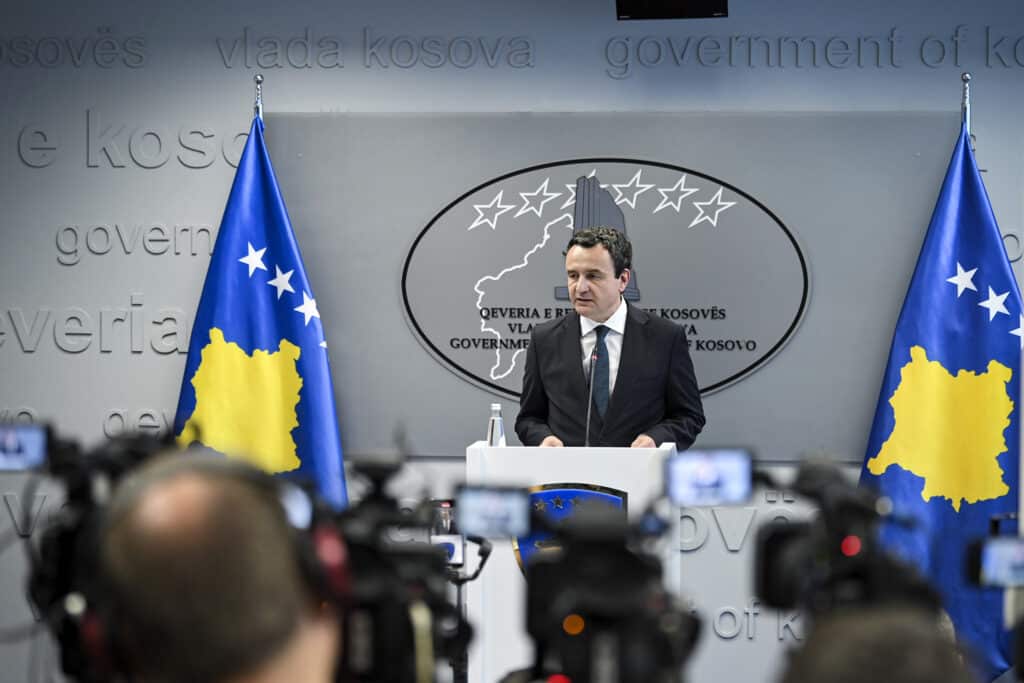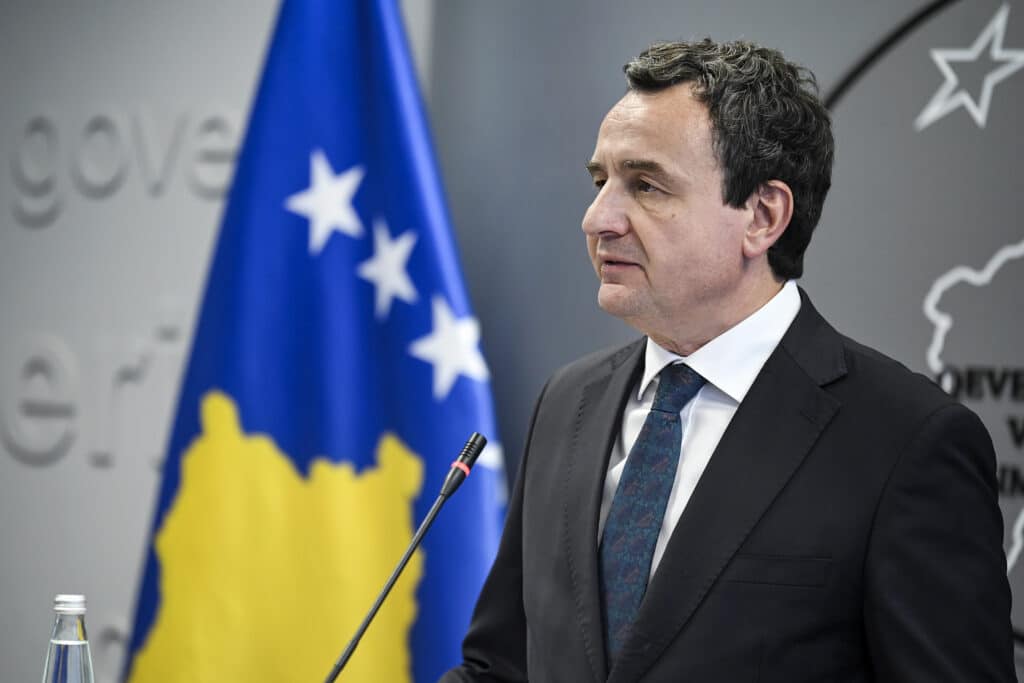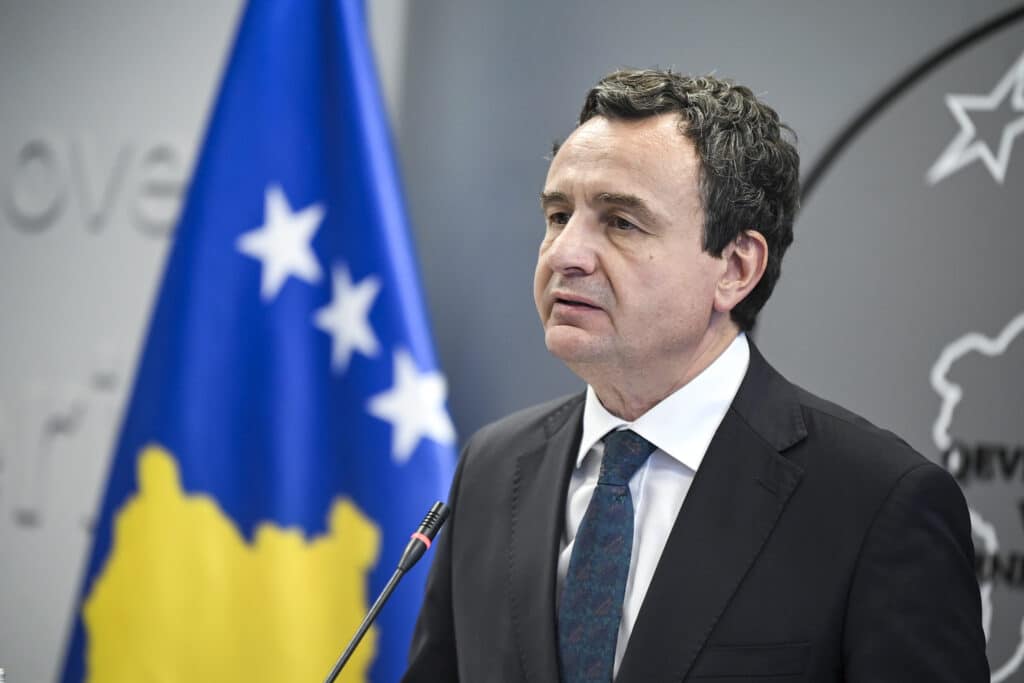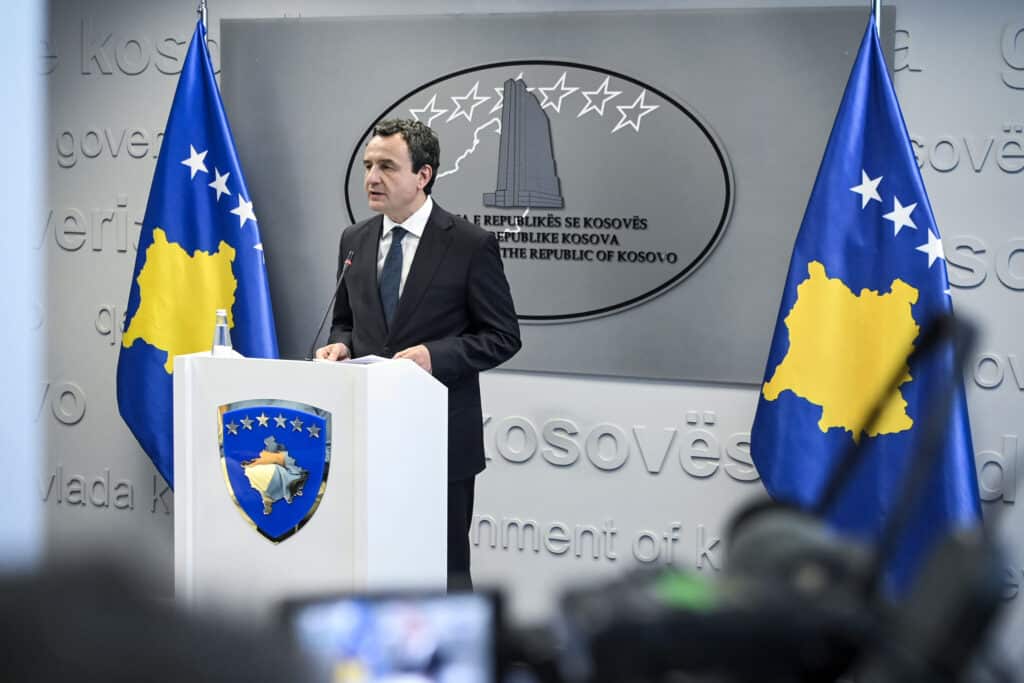Below is the full speech of the Acting Prime Minister of the Republic of Kosovo, Albin Kurti, at the press conference called by the Prime Minister’s Office in response to the threatening statements made by the President of Serbia, Aleksandar Vučić, toward the Republic of Kosovo on July 20, 2025.
Prishtina, July 21, 2025
Dear journalists,
Dear citizens,
The Republic of Kosovo is a democratic and lawful state, with a separation of powers, consolidated institutions, and equal enforcement of the law throughout its territory.
The rule of law is the foundation of our state. It does not discriminate by ethnicity, status, political influence, or any other affiliation. Anyone who violates law and order will face justice.
The case of Igor Popović, arrested on July 18, 2025, on suspicion of inciting ethnic division and intolerance, is not an exception. He is being handled by Kosovo’s justice institutions professionally and in accordance with all national and international human rights standards.
The statements made by the President of Serbia, Aleksandar Vučić, on July 20, 2025, are threatening, destabilizing, and entirely unacceptable. When a president—who is also the supreme commander of a state’s army—issues public threats using conflict-inciting language, this is no longer a personal stance, but state policy.
In doing so, official Belgrade clearly shows that it does not support justice, peace, and stability, but rather promotes tensions and hate speech in the region. It also shows that the declarations made by Igor Popović contribute to ethnic division and intolerance. By attacking the most sacred value of Albanians—the Kosovo Liberation Army—through such clearly coordinated statements, they aim to incite and provoke tensions.
Such statements constitute a direct threat to peace and security in the Western Balkans. They should not be underestimated, because they come from a leader who controls the military and security apparatus of a state that has historically violated the rights of neighboring peoples, including the commission of war crimes, crimes against humanity, and genocide. To this day, Serbia has not apologized for these crimes committed in our country. On the contrary, it seeks to deny and relativize them in every international forum. It does so in collaboration with its ally, the Russian Federation, continually seeking to rewrite or revise history, as it is otherwise called.
This is not the first time that Vučić’s Serbia attempts to interfere in Kosovo’s internal affairs through illegal structures and hybrid actions. To date, thanks to the professional work of our intelligence, police, and other security and justice institutions, in just over a year, six individuals have been arrested in Kosovo for espionage in service of Serbian security structures. These are not isolated incidents; they are part of a continuous destabilization strategy against Kosovo’s state institutions, which have responded and will always respond appropriately.
The leader of Kosovo’s northern neighbor not only organizes and supports such actions but continues to instrumentalize criminal and terrorist groups for political and state purposes. Let us recall the abduction of Kosovo Police officers on June 14, 2023, the attack on KFOR on May 29, 2023, the aggressive, terrorist, and criminal attack on September 24, 2023, in Banjska—led by the main criminal Milan Radoičić, vice-chair of the Serbian List and a close ally of Vučić—followed by the terrorist attack on the Ibër Lepenc canal on November 29, 2024, and continued threatening statements from top Serbian officials, always led by Vučić. This paramilitary group continues to be publicly, politically, and financially supported by state structures in Belgrade.
Recently, there have been documented cases where members of this group were used for the personal security of Vučić, being even closer to him than his official close protection, and for suppressing civic protests in Serbia. This reflects the miserable state of rule of law in Serbia and the direct involvement of criminal groups in Vučić’s state apparatus. Kosovo persistently demands the extradition of Radoičić and the 44 other members of the paramilitary and terrorist group. But the Serbian president not only refuses to hand them over—he exploits them to intimidate students and citizens within Serbia itself, using methods from the 1990s, similar to those used by Milošević, under whom Vučić once served as Minister of Information and Propaganda.
Kosovo, on the other hand, will not tolerate any form of involvement of such groups in public life. The law will apply to anyone who breaks it. Kosovo will not allow normalization of hate speech, ethnic division, or denigration of our national, historical, and civic values. We are not intimidated by Vučić’s rhetoric, but we are determined to protect our law, order, and democracy. Vučić may speak and act with Milošević’s language in Serbia, but the time when he could do so in Kosovo is long gone—and it will never return.
In the mindset of Serbia’s authoritarian and pro-Russian leadership, enforcement of law and order by independent and legitimate institutions may have “unpredictable consequences,” as they put it. So, to threaten a neighboring state like the Republic Kosovo where there is rule of law, they send officials like Igor Popović to stir division and intolerance, and then issue threats of consequences. This is the true face of Serbia which, despite the passing of years and its formal declarations of interest in joining the European Union, is not changing.
In light of these threats, we urge all citizens of Kosovo to avoid traveling to Serbian territory, as there are signs of risk from provocations and arbitrary detentions by Serbian authorities. At the same time, we call on citizens for calm, cooperation with the institutions of the Republic of Kosovo, and to maintain unity and composure.
We also call on the European Union, NATO, and the entire international community to react clearly and decisively to Vučić’s threats which are not mere political statements, but part of a well-organized campaign to destabilize Kosovo and our Western Balkan region. Serbia is proving not only disinterest in normalization but also active involvement in dangerous provocations and attempts to interfere in other states—to export the internal instability and unrest generated by its authoritarian and corrupt governance. For comparison: according to Transparency International’s Corruption Perceptions Index, Kosovo has improved by 22% since 2019, while Serbia has worsened by 10%. In 2025, the gap between Kosovo and Serbia will likely deepen.
We are committed to the sustainable integration of Serbs into our society and institutions, especially through employment and education. Our government has depoliticized the integration of Serbs in Kosovo—not through backroom deals with shady actors, but through law, order, professionalism, and meritocracy. Our citizens’ goodwill has never been lacking, although it has often been challenged by illegal structures and criminal groups. We have confronted Serbia’s structures in Kosovo, not Kosovo’s Serbs. Those who equate Serbs with Serbia are misinforming—and often, they are the same people who equate Vučić with the Serbian people and state. We have replaced illegal structures with Republic institutions; instead of criminal groups, we now have rule of law and public order. As a result:
• Since the collective resignations of Serbian police officers in northern Kosovo in November 2022, 208 police officers, new cadets from the Serbian community have joined the Kosovo Police and now serve citizens equally throughout the country.
• Since April 2024, around 800 citizens from the four northern municipalities of the country have found employment through government mediation, as a result of the “Government for Families” employment measure.
• Over 430 new businesses have been registered in these four northern municipalities of our Republic within a year and a half, from January 1, 2024, to June 30, 2025.
• Meanwhile, the process of verifying diplomas issued by the University of North Mitrovica is ongoing, with the aim of facilitating access to employment opportunities for citizens from the Serbian community. So far, 403 such diplomas have been verified.
Kosovo remains committed to its path toward EU and NATO membership, with full confidence in the power of law and the civic will for peace and progress. Once again, we reaffirm that in the face of Vučić’s “unpredictable” threats, the Republic of Kosovo is resolute in defending its state sovereignty, territorial integrity, constitutional and legal order, peace, and security.





